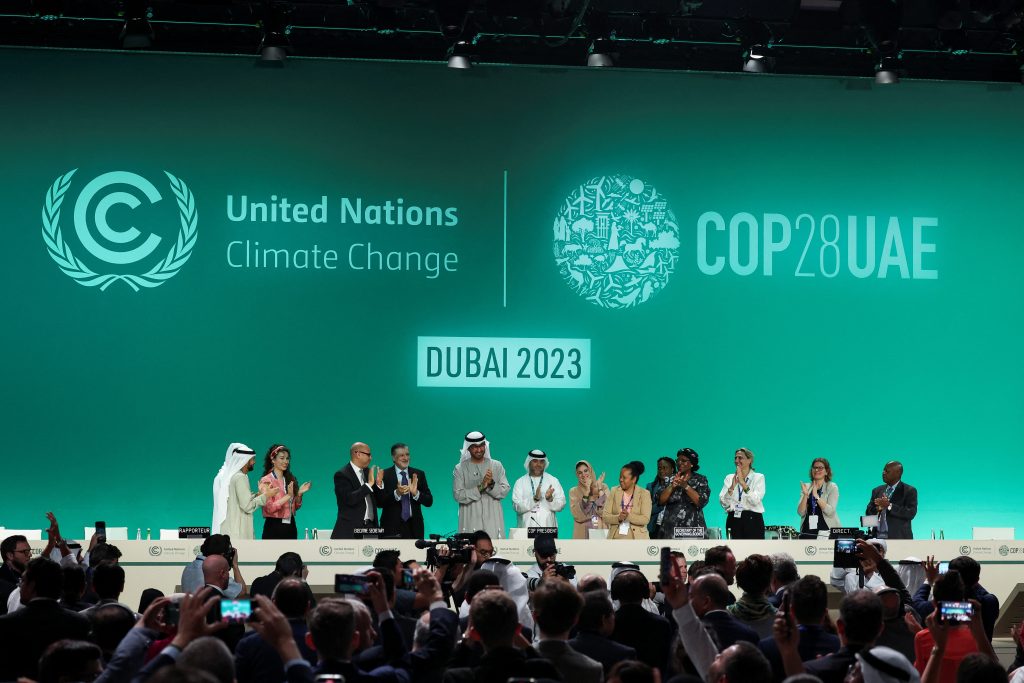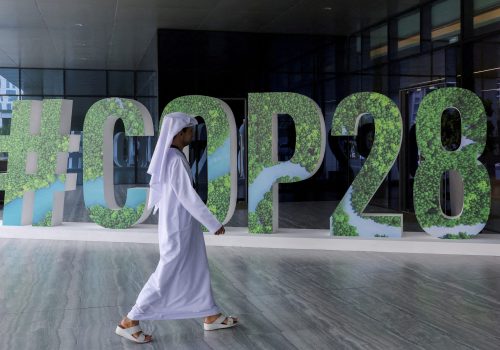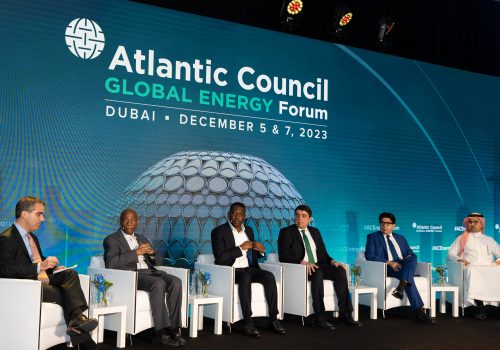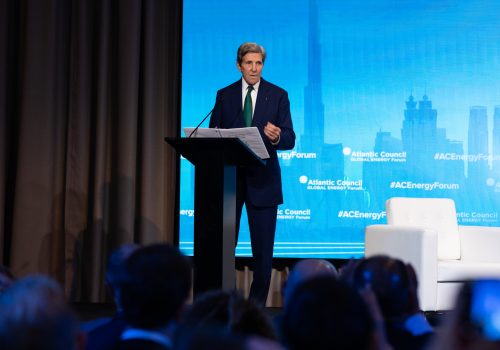GET UP TO SPEED
After fourteen days in the desert, it ended with a “beginning.” On Wednesday, the 2023 United Nations Climate Conference in Dubai, also known as COP28, concluded with nearly two hundred countries agreeing to “transition” away from fossil fuels. UN Climate Change Executive Secretary Simon Stiell called the decision the “beginning of the end” of the fossil fuel era. But the agreement text was only one of many outcomes from the conference, including the activation of the loss and damage fund and pledges to abate methane emissions and triple renewable energy. Below, Atlantic Council experts who were on the ground in Dubai share their insights on the agreement and the road ahead.
TODAY’S EXPERT REACTION COURTESY OF
- Jorge Gastelumendi (@Gasteluj): Director of global policy at the Adrienne Arsht-Rockefeller Foundation Resilience Center and former climate negotiator for the government of Peru
- Landon Derentz (@Landon_Derentz): Senior director of the Global Energy Center and former director for energy on the US National Security Council
- Aubrey Hruby (@aubreyhruby): Nonresident senior fellow at the Africa Center and co-founder of Tofino Capital
- Racha Helwa (@rachahelwa): Director of the empowerME Initiative
No ‘phase-down’ or ‘phaseout’
- The compromise agreement to transition away from fossil fuels was “commendable,” Jorge tells us, but the lack of a timeline for attaining this goal “puts the world at risk of crossing the 1.5 °C warming threshold, significantly increasing the risks and impacts of climate change.”
- At the same time, “the ‘success’ of COP28 was never going to be measured by unrealistic expectations around phasing out fossil fuels,” says Landon.
- Among the opponents of “phaseout” language were African nations. Aubrey points out that this is because they “need to be able to harness their fossil fuel resources, namely natural gas, in order to provide electricity to the six hundred million” people on the continent who lack reliable access.
- But for others, the compromise was a deep disappointment. The decision “evoked widespread frustration, notably among the small island developing states, indigenous communities, and climate activists,” Racha says.
Big wins
- The compromise over fossil fuel use overshadowed what COP28 had already accomplished, says Landon: pledges on renewable energy capacity expansion, energy efficiency, and methane reduction that add up to “a global reduction in energy-related greenhouse gas emissions by 2030 of around four gigatons of CO2 equivalent.”
- And in a larger sense, Landon adds, the cooperation of governments and businesses means that “the fabric” of these conferences “has been permanently altered.” A senior European official attending the conference told Landon that “COP is the ‘new Davos’ for the energy transition.”
- That spirit came in the increased climate commitments from industry. “We have seen at COP28 an unprecedented participation of the private sector not only in numbers but also in real leadership,” Jorge tells us, “taking on actions and measurable commitments in the energy, insurance, and banking sectors, among many others.”
- African countries were able to achieve most of their pre-COP checklist, Aubrey notes: These include the launch of the loss and damage fund, $175 million in pledges to the Alliance for Green Infrastructure in Africa, and the Declaration on Climate and Health.
Room for improvement
- But the agreement lacks quantifiable targets or substantial financial aid for adaptation, says Jorge, meaning it falls short of the “pivotal moment we need as a global community to bring climate adaptation from being a second-tier priority in the climate process” to being prioritized equally with mitigation.
- Protests throughout the conference, including that of twelve-year-old Indian climate activist Licypriya Kangujam, “highlighted concerns about the influence of oil businesses on climate equity and resilience,” and encapsulated “the perspective of the upcoming generation from the Global South regarding the outcomes of this COP,” writes Racha.
- Zooming out, the goal now for governments, activists, and industry should be to make sure that these promises don’t end up as just hot air. “Global meetings alone do little to change the economic and climate realities on the ground in African countries,” Aubrey tells us. “Pledges must become reality.”
Further reading
Thu, Nov 30, 2023
Expert analysis: The successes and shortcomings in the fight against climate change at COP28
New Atlanticist By
Our experts dispatched to Dubai, where they analyzed how global leaders responded to the greatest challenges posed by climate change.
Fri, Dec 8, 2023
What the Global South needs for a just energy transition
New Atlanticist By Katherine Golden
Achieving a just energy transition for the Global South may require a complete reversal in the way the world has operated for centuries.
Wed, Dec 6, 2023
John Kerry unveils a ‘critical’ new US strategy to expand fusion energy
New Atlanticist By Katherine Golden
"We need to pull ourselves together with every strength we have,” Kerry said on the first day of the Global Energy Forum.
Image: United Arab Emirates Minister of Industry and Advanced Technology and COP28 President Sultan Ahmed Al Jaber attends a plenary meeting, after a draft of a negotiation deal was released, at the United Nations Climate Change Conference COP28 in Dubai, United Arab Emirates, December 13, 2023. REUTERS/Amr Alfiky



